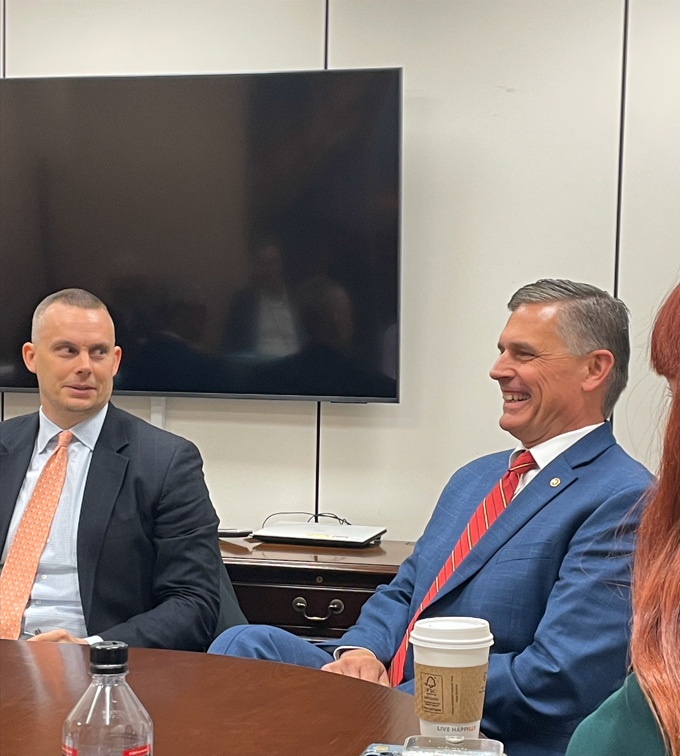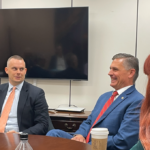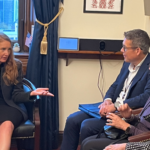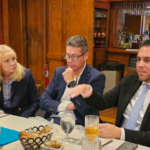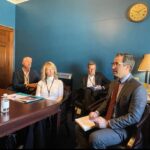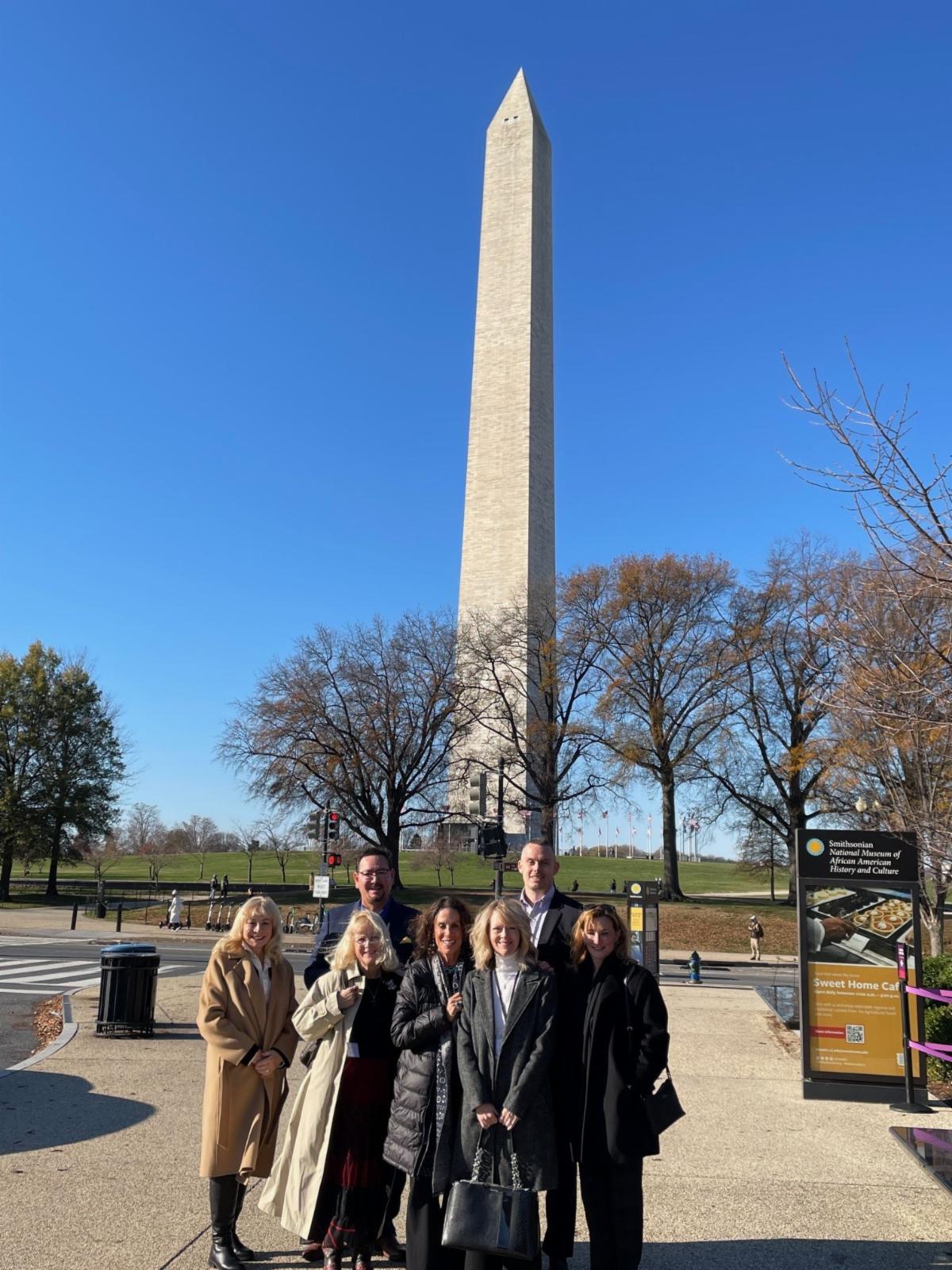
It’s December — which means it’s time for the Greater Albuquerque Chamber of Commerce Washington DC Fly-In.
Twelve members flew to Washington, D.C., and spent three days in meetings with the state’s congressional delegation and policy experts – and also got in a bit of sightseeing.
The GACC group kicked off meetings Dec. 11 with Sen. Martin Heinrich, D-N.M. GACC Board President Del Esparza presided.
Heinrich addressed a wide range of issues with the Chamber members, including public safety, homelessness, artificial intelligence and the Inflation Reduction Act.
He described his office’s three-pronged effort to fight fentanyl, which includes permanent scheduling of the drug, improved technology at the border ports of entry and targeting manufacturing sites in Mexico. And he said his office has been working with sheriff’s offices and police departments to get them the tools and training, such as to process evidence, that they need to not only solve crimes but successfully prosecute them. “If people don’t feel safe and secure,” Heinrich told the group, “they can’t think about anything else.”
The senator also voiced strong support for Albuquerque’s Gateway Center being a no-barrier shelter with more beds to address homelessness.
Next was a luncheon meeting with Rep. Gabe Vasquez, who represents Congressional District 2; Chairman-elect Peter Lorenz, CEO of Unirac Inc., presided over the meeting.
Vasquez echoed the need for improved and expanded technology at the border to better secure it, and laid out the balancing act required to fight smuggling but protect the supply chain and jobs. He also advocated for a humane farm worker policy for New Mexico’s agricultural sector.
Vasquez also said he has been working with Gov. Michelle Lujan Grisham’s office on public safety reforms to be introduced in the 2025 legislative session, proposals that will help make “people move to our state.” As for the upcoming transition of power in D.C., he acknowledged our state is dependent on the federal government – especially in education, laboratories and military installations – and he is concerned the proposed Department of Government Efficiency will “chip away at what we need in N.M.” He said he is “keeping an eye on how it will affect New Mexico” and hopes it will use “a scalpel, not a hatchet.”
Right after this meeting it was off to Rep. Melanie Stansbury, who represents Congressional District 1. The Chamber’s Leean Kravitz, chair of federal government affairs and vice president of public affairs at Fidelity Investments, presided.
Stansbury also said she’s watching the upcoming state legislative session, and behavioral health is one of the top issues she thinks she can help with by obtaining funding to build out facilities and coordinating state and federal law enforcement’s attack on fentanyl. “It has to be a two-part strategy,” she explained. She also said she has been working with N.M. Speaker of the House Javier Martinez, D-Albuquerque. And she said she thinks the root problem regarding behavioral health is not funding but coordinating treatment, and having a philanthropic/business entity step in to do a needs assessment that identifies available programs, beds, clinicians, etc. would help address it.
Stansbury said she anticipates a chaotic transition of power and her constituent services team has been inundated with calls from employees asking “what if I’m on the chopping block?”
“We’re heading into uncharted territory,” Stansbury said.
On Dec. 12, the GACC group met with with Mark Zientek, senior advisor on business to Rep. Teresa Leger Fernandez, who represents Congressional District 3. Kellie Mixon, GACC treasurer and president and CEO of New Mexico Mutual, presided over the meeting.
Zientek provided a rundown of what the office is working on, including reviving the Radiation Exposure Compensation Act; securing additional funding for fire relief, police, and technology at the border; attacking fentanyl and protecting the immigrant community.
Regarding fentanyl, Zientek echoed that it will take a two-pronged approach: treatment combined with the message there are consequences for committing crimes.
Zientek also said the office is working to keep Space Command in Colorado, where it can better collaborate with N.M. entities, rather than transfer to Alabama.
Unfortunately, Sen. Ben Ray Lujan’s office was unable to get his schedule to work with the Fly-In. We look forward to continuing to work with him over the next year and meeting with him in December 2025!
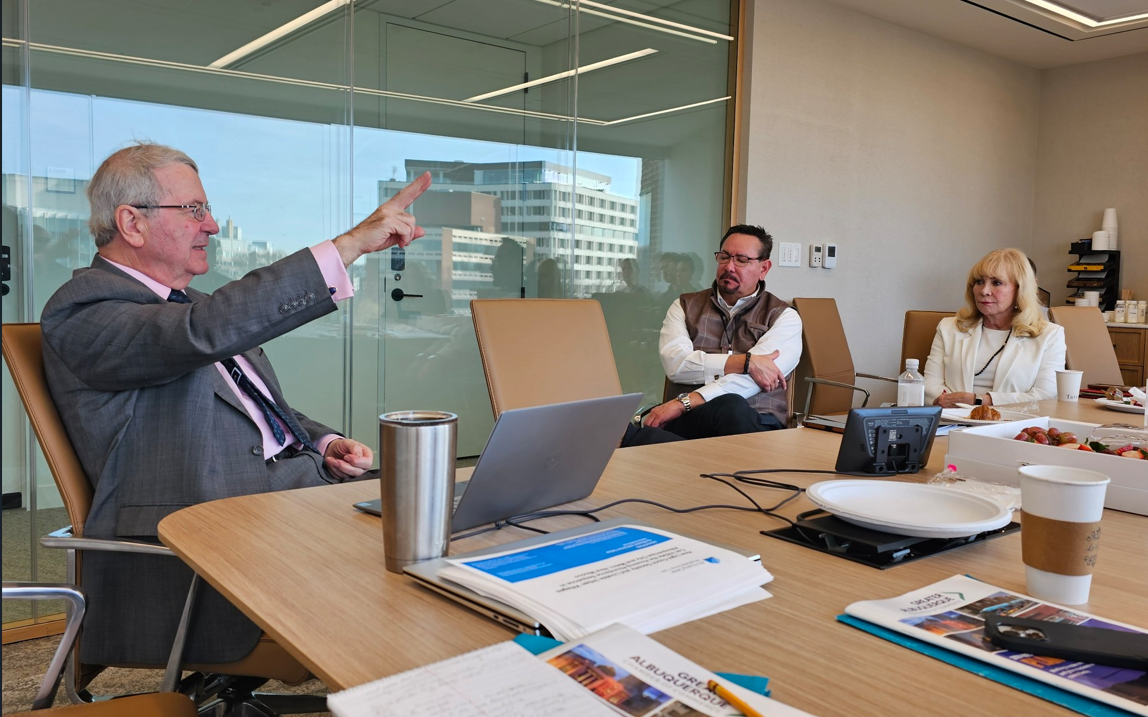
But the group didn’t just meet with the state’s congressional delegation. There were also discussions on the upcoming transition of power with Justin Lumadue, vice president of government affairs at the U.S. Chamber of Commerce; an update on workforce issues from Makinizi Hoover, the U.S. Chamber’s senior manager of strategic advocacy; and Jon Baselice, the U.S. Chamber’s vice president immigration policy, gave the delegation an update. Terri Cole, president and CEO, Greater Albuquerque Chamber of Commerce, presided over these meetings.
The group also met with scholars from the American Enterprise Institute. John Fortier, a senior fellow at AEI, discussed his work, which focuses on Congress, elections and continuity of government. He gave insight about the continuity of government between the Biden and Trump administrations. Sherman McCorkle, chair of the GACC’s legislative session and state government advocacy and chairman and CEO of Sandia Science & Technology Park Development Corporation, presided over that meeting.
The delegation also met with Ed Pinto, who runs AEI’s Housing Center. Pinto presented on housing and homelessness issues with information specific to Albuquerque’s and New Mexico’s struggle. In short, he said the housing shortage is due to a regulatory failure, not a market failure, and that government “help” has in fact sent prices up. Tom Jenkins, Chair, Chair Economic Development Teams, Qualifying Broker, Real Estate Advisors, presided over the meeting.
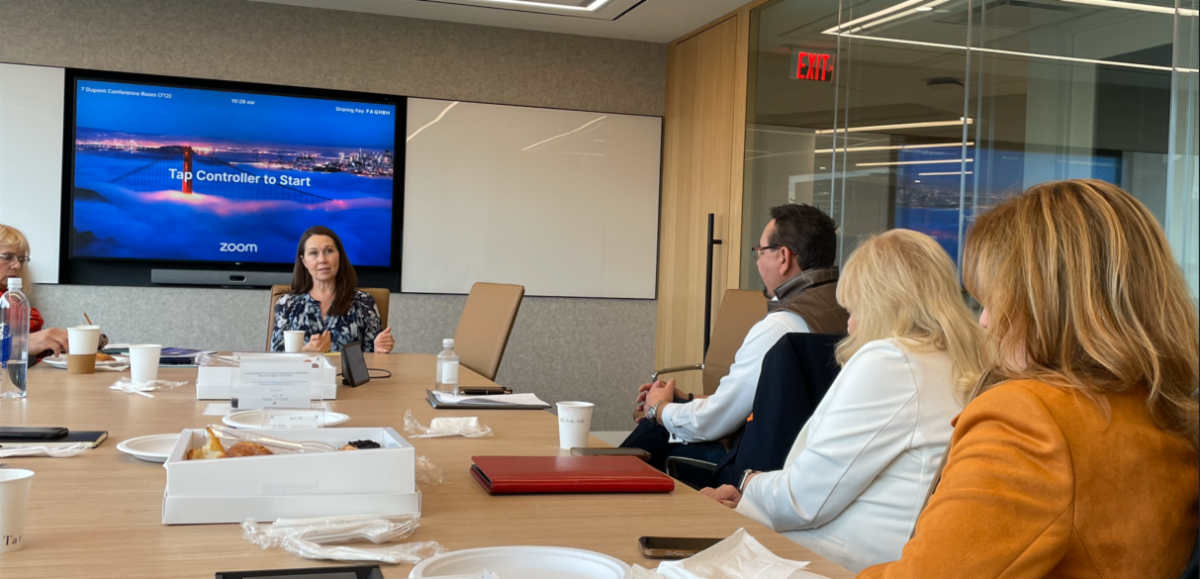
And with education as one of the Chamber’s Bold Issue Groups, the delegation was eager to meet with Starlee Coleman, National Alliance for Public Charter Schools president and CEO, to hear her thoughts on the future of education. Scott Hindman, chair of the Public Safety BIG and executive director of Excellent Schools New Mexico, presided.
Coleman shared there are processes and procedure in place that make the elimination of the Department of Education a non-starter. But she did caution that programs and staff could be trimmed and/or consolidated. And she shared that funding for low-income students actually increased in the first Trump administration.
Coleman also said the nominee for U.S. Education secretary appears focused on higher education and expanding Pell Grants to trade schools, rather than dipping into K-12 issues.
And Coleman cited a Harris poll that found broad support across the country for charter schools, and said for the “working class it is a strong wedge issue – they will cross party lines to support” them.
In addition to all the informative meetings, the GACC group also visited the National Museum of African American History & Culture and ate in some iconic and delicious D.C. restaurants.
The Chamber thanks all those involved in Washington, D.C., who helped make the trip another success, and the participants, including:
- Del Esparza, Chairman of the Board, CEO of Esparza Advertising
- Peter Lorenz, Chair-Elect, CEO, Unirac, Inc.
- Leean Kravitz, Chairman of Federal Government Affairs, Vice President of Public Affairs at Fidelity Investments
- Sherman McCorkle, Chair of the Chamber’s Legislative Session; Chairman and CEO of Sandia Science & Technology Park Development Corporation
- Tom Jenkins, Chair, Chair Economic Development Teams, Qualifying Broker, Real Estate Advisors
- Scott Hindman, Chair, Public Safety BIG, Executive Director, Excellent Schools New Mexico
- Kellie Mixon, GACC Treasurer, President and CEO, New Mexico Mutual
- Joanie Griffin, Board Member, Founding Principal, SUNNY505
- Aimee Barabe, New Mexico Gas Co, Director of State and Community Relations



